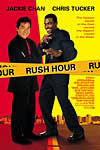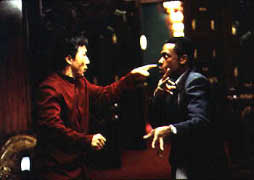
The road less traveled. RUSH HOUR Screenwriter Ross LaManna
March 11th, 2004
The road less traveled. An interview with RUSH HOUR
Screenwriter Ross LaManna
by Christopher Wehner
Date: 4/2/02
I’ve had a lot of luck lately getting interviews with some of the classiest writers working in the business, and Ross LaManna is no exception. When he wrote RUSH HOUR, and it became a hit, Ross could have pretty much done anything he wanted. Instead of going for the money, he did what he always wanted to do, he wrote a book...on spec, so he got paid nothing while writing it.
 Ross first landed a term deal at United Artists, where he wrote CHROME SOLDIERS, a USA Network movie starring Gary Busey, and Yaphet Kotto, which first aired in 1993. He then worked on several projects for Carolco Pictures, including UNIVERSAL SOLDIER, and CLIFFHANGER, starring Sylvester Stallone and directed by Renny Harlan. His original screenplay, ARCTIC BLUE, became an HBO World Premiere Movie (1995) starring Rutger Hauer and directed by Peter Masterson. His spec script RUSH HOUR, starring Jackie Chan and Chris Tucker, became one of the top ten films of 1998 and broke several box office records. For more about Ross, see his web site: http://www.rosslamanna.com
Ross first landed a term deal at United Artists, where he wrote CHROME SOLDIERS, a USA Network movie starring Gary Busey, and Yaphet Kotto, which first aired in 1993. He then worked on several projects for Carolco Pictures, including UNIVERSAL SOLDIER, and CLIFFHANGER, starring Sylvester Stallone and directed by Renny Harlan. His original screenplay, ARCTIC BLUE, became an HBO World Premiere Movie (1995) starring Rutger Hauer and directed by Peter Masterson. His spec script RUSH HOUR, starring Jackie Chan and Chris Tucker, became one of the top ten films of 1998 and broke several box office records. For more about Ross, see his web site: http://www.rosslamanna.com
(Note: this interview took place a few weeks after September 11th.)
How has September eleventh impacted you as a writer? Has it caused you to do some self-reflection? Are we too violent a culture; our entertainment is certainly violent in nature.
Are we too violent? Probably, I think we’re too inappropriately violent. Violence has a place in popular entertainment. Shakespeare used it. Aristophanes used it. So if it’s used without impact or without meaning then it becomes desensitizing. A personal observation on 911, the first two days the human impact was an intellectual thing for me, not a visceral one. I knew there were people in the building, I watched it crumble. I intellectually understood that. But it looked like a special effect. The human reality of it that stuck in my head happened at the end of the second day when I saw the families on T.V. The image of a little girl holding up a poster of her missing father, that was more horrific than the images of the airplane hitting.
So I think the bigger the blow up the less it means when I’m writing something. If it’s something where there are characters we care about and there is just the threat of violence, I think that’s far more effective and real. The net result of violence for violence’s sake is that you do get desensitized to that. Should we stop making violent movies? No, but I think if you’re going to show that type of stuff you shouldn’t make it look cool and glorify it.
We can’t forget though, that we’re in the myth making industry. If you look at history, during World War II they still made war movies. So to say we’re not going to do any of those kinds of movies isn’t reasonable.
It’s our own form or propaganda.
Well, it’s more than that. Remember that old cliché about the caveman sitting around the fire and he started telling a story, and it created myths. And myths really do help us work through the things we don’t understand. So everyone in popular entertainment has an opportunity to help others work through this stuff through myths.
Is there an event that made you want to be a writer, when did you know what you wanted to do?
Pretty earlier on. My stock answer is that, "I was fundamentally unemployable," what else do you do right? [Laughs] But I think in high school I realized I had an aptitude for it. I was very interested in the movies. Even back than I was very impacted by movies, and saw how movies impacted those around me. Not in terms of the message, but in terms of the community of emotion. You can make people happy. That’s very cool to me.
You’ve written mainly sci-fi and action comedy stuff, what led you there?
I think it’s mostly what I like. I stay close to home in terms of what I like. I have to have a passion for it.

Was RUSH HOUR your first spec sale?
No, I had written a spec a couple of years before that that ended up being on HBO called ARTIC BLUE. Before that I did CROME SOLDIER, which was an assignment. When I first started, about ten years ago, I wrote a spec script that never was made called FAMILY HONOR, sort of a mob comedy. Columbia picked it up and that got me going. And then, when you’re sort of the new kid, they throw a lot of rewrite assignments at you. Which I thought was cool. I made a lot of money and everyone was real nice to me. But soon I realized that even though I felt I did my job well and improve the script, I was stuck in the development business and I wanted to write my own movies. So I went back to writing specs.
How important was your USC education to your career?
Not very, but I’m glad I did it.
Did it give you any more credibility when you were starting off?
No. Where it did help me was getting my first day job in the business to support myself. I got a job at a small studio working in the legal department [laughs]. I worked during the day and at night wrote, like everyone else.
What about in query letters early on. I would think being able to mention that you went to the USC film and screenwriting school helped?
Yeah, well, I’d love to say it did as I loved my experience at film school. But the fact is, as a screenwriter, your script is your degree. It’s your film school. It’s all about that script. For aspiring directors I think film school is more valuable. School provides the structure for directors. So I’m not putting down film schools. As a screenwriter you do gain a lot of valuable knowledge from professionals, and that’s important. I’ve done some teaching myself.
How did you come up with the idea for RUSH HOUR?
I wanted to do a kidnapping story, but it was like, "what the hell do I do to make it fresh?" Then it came to me, "what it the victim was from a foreign country that’s unfriendly to us. That’ll add some jeopardy." And what if the people investigating are also foreign to each other, wouldn’t that sort of up the ante on the buddy comedy genre? In LETHAL WEAPON it’s fun and a good thing. But all they really [Gibson and Glover’s characters] don’t have in common is that one guy is a nut and other guy is grounded. They really didn’t make anything out of the racial differences. So I thought about everything that would be different between to guys working on the same case from different countries. They wouldn’t even speak the same language. Then what happens? So I was just looking for a fresh spin on the genre.
How hard is it to write the action/buddy/comedy movie? On the surface it may look easy, but there only seems to be a handful of writers who can pull it off.
That brings me to what I think is a good point. We all know how good the actors were in the movie, but lets not forget Brett Ratner, the director. Tell me how many directors do comedy well, how many can do action well, and than name me how many can do both well? This guy is on a very short list and is very talented. There are very few decent action and comedy directors and he does both very well. It's hard to do since you’re juggling both. You have to keep the plot going, the jeopardy up, and you’re able to take a breath and have a laugh. It’s hard to do.
I read one of your drafts for RUSH HOUR on line, how was the rewriting process?
The one draft I saw, and I was surprised, was a very early one. That early draft was definitely darker, and would have been more of an action thriller than a comedy. Once Disney bought it they said they could get Jackie Chan, and it started down the road to more of a comedy. Because as soon as you have Jackie you can retain the stakes, but the violence and relationships are going to be different and it’s going to be a whole different kind of movie, jut because of him. So you sort of have to act accordingly.
Would you have liked the darker layers of that early draft left in?
Once Jackie was aboard it was a different movie. His part was much smaller in my original drafts. The Chris Tucker part was more Wesley Snipes or Bruce Willis, a little edgier. The bottom line, "was the movie any good?" And it was. So if you’re going to be rewritten, you hope for a good movie. But on the other hand, you just cringe when you get rewritten. I was delighted with RUSH HOUR and what they ended up doing with it. I’m a big Jackie Chan fan.
You write a hit movie, and probably had some good offers for rewrite assignments, and instead you write ACID TEST, a book. You didn’t go for the money. That’s not the norm.
Yeah, half of my friends said, "Dude!" and the other have said, "You’re nuts." But I view that as buying me freedom. Because I did establish a sort of successful franchise, and I guess I’ve moved up the food chain a little when I’m pitching a project. I always wanted to write a book and I thought this was my opportunity. RUSH HOUR was a great thing, and what it did most off all was buy me time. I did do some screenwriting. I worked on a few drafts of the HOGAN’S HEROES movie. I also did some T.V. stuff. So I felt like I did exactly what I wanted to do. I see some writers take that upward trajectory and it sometimes winds up taking them further away from their own definition of success. That’s why you see a lot of cranky screenwriters. They throw money at you, assignments, but you’re not getting any satisfaction. It all comes down following your own definition of success. And my definition is simple, "I do what makes me happy." I have an office thirty feet from my house. I have breakfast and dinner with my kids. That’s my definition of success. I went for happy, and I’ve made plenty of money. I’m very lucky.
More recent articles in Interviews
Only logged-in members can comment. You can log in or join today for free!
No comments posted.
Advertisement

















